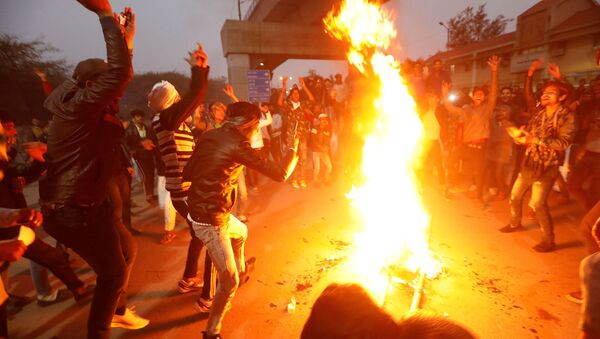The ongoing nationwide agitation against the contentious Citizenship Amendment Act (CAA) is a blatant exploitation of opportunism in Indian politics, an Indian economic and political analyst has said, warning that these disturbances have the potential to destroy the country if not stopped.
“Opportunism in politics I can understand from the point of power is important, but the most pertinent from the point of power, and currently disgusting form of opportunism in (Indian) politics is in the Citizenship Amendment Act (CAA)", said Swaminathan Gurumurthy, Chairman of the Vivekananda International Foundation, a New Delhi-based public policy think tank.
Participating in a talk on “Opportunism in Indian Politics” in New Delhi, Gurumurthy admitted that Indian politics has been in a constant state of flux since 1989 owing to its diversity and increasingly growing regional character.
“The quality of politics in India has become highly opportunistic, devoid of ideologies and focused on the promotion of narrow interests and identities. Regional parties have emerged as king makers in the process of facilitating government formation both at the centre and in states. This has had an inevitable impact on the quality of governance", Gurumurthy said.
The Citizenship Amendment Act (CAA) needs to be understood in an objective and unbiased manner as well as in its historical context, said Gurumurthy, who is one of the members of the Board of Directors of the Reserve Bank of India, the country’s apex bank, besides being a well-known journalist and author.
He stated: “In simple terms, the Citizenship Amendment Act says that from the three countries with which we (India) have had a historical problem, the minorities from those countries will be given citizenship. This is not the stand of this (Modi-led) government. This was the stand of Mahatma Gandhi in 1947 July 7".
Gandhi even said that “all Hindus and Sikhs who are persecuted there (in Pakistan) are free to come to India and we will take care of them”.
He recalled that even India’s first Prime Minister Jawaharlal Nehru had made a statement in Parliament, where he said: “We owe a duty to these people and if the citizenship law has to be amended for this purpose, we will amend the law".
“That he (Nehru) did not do so is a different thing. Opportunism is not to be defined only in terms of acquisition of power, but it should also be seen as something that is disturbing to the country itself", he stated.
He identified the country’s main opposition Congress party, the Communist Party of India (CPI), and the Communist Party of India-Marxist (CPI-M) as political groups that had once been champion supporters of granting citizenship to persecuted minorities in neighbouring Pakistan and Bangladesh.
To substantiate this view, he said it is ironic that Tarun Gogoi, former chief of the Indian state of Assam where the anti-CAA protests have been most vociferous, is petitioning the Supreme Court to tell the government to withdraw the legislation.
He recalled, in 2012, Gogoi had submitted a memorandum to the then Prime Minister Manmohan Singh “pleading that those who had to flee due to discrimination and religious persecution at the time of partition (of India in 1947) should not be treated as foreigners”.
“This is precisely what the CAA says and these are the very people opposing it today. Is there a greater opportunism than this? And this opportunism is not for power, it is for disturbing India. If it is not stopped, it can destroy India. You cannot allow the majority community people from Pakistan or Bangladesh into India unless you want to destroy India", Gurumurthy said.
“The problem is with the national parties (read Congress and the BJP). How many regional parties are supporting it, very few. Like those who have stakes like Bengal. We must understand that regional parties are not necessarily the disturbing factor; a greater disturbing factor can be the national parties themselves", he added.
The CAA has evoked widespread protests in different parts of the country for allowing Indian citizenship to only non-Muslim communities from Pakistan, Bangladesh, and Afghanistan. The Muslim community, however, views the proposed National Register of Citizens (NRC) as a means to confine them to being second-class citizens. Prime Minister Narendra Modi has dismissed these concerns, saying that the law doesn't discriminate against Muslims.




